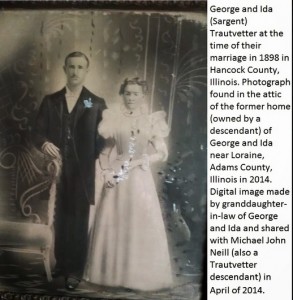There are times when the more redundant a statement is, the more truth it actually contains. “When you are dead, you are dead,” is one of those statements. At that point, control really is gone and what control a person tried to exact from beyond the grave is dependent upon those who are left behind.
When you are dead, you really don’t have any control over what happens and your time is up to create an environment in which your genealogical legacy is preserved. It is over. You had your chance.
In most genealogy seminars at some point I usually mention the importance of preserving information beyond the lifespan of the genealogist who compiled it. I stress that this preservation needs to be done while the genealogist is alive and able to direct and organize these decisions. At one seminar, an attendee shot up her hand and, after being acknowledged, said:
“My will says what will happen to my materials. That takes care of it.”
She had issued her edict. Her material was preserved because she had put a clause in her will.
My thought was “oh…what a naive view of probate what a naive view of how libraries and societies are able to handle acquisitions.” My spoken response was much softer and indicated that it was important to organize materials while one was still alive and make certain that recipients were aware of their pending gift.
The fact remains that when a genealogist is dead…they are dead. A will may mention what is to happen to a boxes of genealogy papers, but if there are no surviving family member with an interest in those papers, their disposition may still fall to the garbage collector the Wednesday after the will is admitted to probate. The executor and the judge usually have priorities that revolve around money. Final bills need to be paid, financial accounts need to be closed, real estate needs to be settled, a residence needs to be cleaned, etc. Those papers may not be high on anyone’s priority list. Without someone having a vested interest in those papers, the bequest may not end up being fulfilled in quite the way a person intends.
Unorganized boxes of papers are not always a welcome gift to a library or group who had no idea they were coming either. The recipient may have no place to store those papers, no staff to organize them, and no funds to maintain them. The recipient of the gift may not even be able to accept them.
And the following Wednesday is still garbage day.
In response to some emails and to some events in my personal life, I’ve taken a new interest in this topic.
Stay tuned–there may be some opinions expressed in the upcoming posts on “preserving beyond your lifetime.” Some readers may not agree with those opinions. But if we’ve caused to think about “preserving beyond your lifetime,” then the purpose has been served.


4 Responses
I don’t have much ephemera to worry about, I mostly have everything stored online. I have done one thing that will ensure that some of my genealogy is preserved for future generations, I have proven that I am a direct descendant of UE loyalists and have given permission to anyone who wants to use my proofs for their certification.
I have a blog as well, Ancestral Notes, I haven’t done any blogging for a couple of years though, but it has hundreds of posts. I think I have something about most of my ancestors, most everything I know about them anyway. I have a couple of online trees on different sites as well.
Thank you!!! I’m really looking forward to your ideas and suggestions. And I’ve been thinking about my previous email. Nothing – not the internet nor a library/society nor DVD’s nor summaries left for family – is destruction proof. So I’m having an attitude adjustment — I did this research because I loved mysteries and the hunt. But also to share and have a legacy. So using the 80/20 principle my research is 80% the joy of the hunt and 20% something to pass on and if it gets lost it doesn’t mean 30 yrs are wasted. Or maybe even 90/10. Doesn’t mean I won’t take care to preserve it appropriately. But I’m hoping this attitude (and your series) will lighten the pressure I’m feeling and bring the fun back.
I’ve been thinking about this and you are right that nothing is destruction proof. I also readily admit that part of the “fun” of research is the finding and discovery…it’s not all about preserving anything. I’ve also been thinking about what to preserve as well as how to preserve it. Is it necessary to preserve copies of things that are readily available? I’m not exactly certain what the answer is, but I do want to keep some discussion of this going.
And I think I forgot to say that you are welcome…don’t want to forget that!